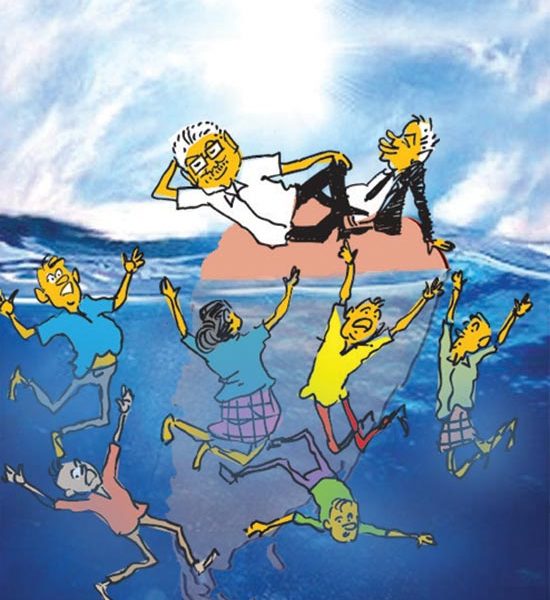Features
Hope and political change:No more Appachis to the rescue

KUPPI on the current economic and political crisis: intervention 1
by Harshana Rambukwella
In Buddhist literature, there is the Parable of the Burning House where the children of a wealthy man, trapped inside a burning house, refuse to leave it, fearful of leaving its comfort – because the flames are yet to reach them. Ultimately, they do leave because the father promises them wonderful gifts and are saved from the fire. Sri Lankans have long awaited such father figures – in fact, our political culture is built on the belief that such ‘fathers’ will rescue us. But this time around no fathers are coming. As Sri Lankans stare into an uncertain future, and a multitude of daily sufferings, and indignities continue to pile upon us, there is possibly one political and emotional currency that we all need – hope. Hope is a slippery term. One can hope ‘in-vain’ or place one’s faith in some unachievable goal and be lulled into a sense of complacency. But, at the same time, hope can be critically empowering – when insurmountable obstacles threaten to engulf you, it is the one thing that can carry you forward. We have innumerable examples of such ‘hope’ from history – both religious and secular. When Moses led the Israelites to the promised land, ‘hope’ of a new beginning sustained them, as did faith in God. When Queen Viharamahadevi set off on a perilous voyage, she carried hope, within her, along with the hope of an entire people. When Martin Luther King Jr made his iconic ‘I have a dream’ speech, hope of an America where Black people could live in dignity, struck a resonant chord and this historical sense of hope also provided inspiration for the anti-Apartheid struggle in South Africa.
This particular moment, in Sri Lanka, feels a moment of ‘hopelessness’. In March and April, this year, before the cowardly attack on the Gota Go Gama site, in Galle Face, there was a palpable sense of hope in the aragalaya movement as it spread across the country. While people were struggling with many privations, the aragalaya channeled this collective frustration into a form of political and social action, we have rarely seen in this country. There were moments when the aragalaya managed to transcend many divisions – ethnic, religious and class – that had long defined Sri Lanka. It was also largely a youth led movement which probably added to the ‘hope’ that characterized the aragalaya. However, following the May 09th attack something of this ‘hope’ was lost. People began to resign themselves to the fact that the literally and metaphorically ‘old’ politics, and the corrupt culture it represents had returned. A Prime Minister with no electoral base, and a President in hiding, cobbled together a shaky and illegitimate alliance to stay in power. The fuel lines became longer, the gas queues grew, food prices soared and Sri Lanka began to run out of medicines. But, despite sporadic protests and the untiring commitment of a few committed activists, it appeared that the aragalaya was fizzling out and hope was stagnant and dying, like vehicles virtually abandoned on kilometers-long fuel queues.
However, we now have a moment where ‘hope’ is being rekindled. A national movement is gathering pace. As the prospect of the next shipment of fuel appears to recede into the ever-distant future, people’s anger and frustration are once again being channeled towards political change. This is a do-or-die moment for all Sri Lankans. Regardless of our political beliefs, our ideological orientation, our religion or class, the need for political change has never been clearer. Whether you believe that an IMF bailout will save us, or whether you believe that we need a fundamental change in our economic system, and a socially and economically more just society, neither of these scenarios will come to pass without an immediate political change. The political class that now clings to power, in this country, is like a cancer – poisoning and corrupting the entire body politic, even as it destroys itself. The Prime Minister who was supposed to be the messiah channeling international goodwill and finances to the country has failed miserably and we have a President who seems to be in love with the idea of ‘playing president’. The Sri Lankan people have a single existential choice to make in this moment – to rise as one to expel this rotten political order. In Sri Lanka, we are now in that burning house that the Buddha spoke of and we all seem to be waiting for that father to appear and save us. But now we need to change the plot of this parable. No father will come for us. Our fathers (or appachis) have led us to this sorry state. They have lied, deceived and abandoned us. It is now up to us to rediscover the ‘hope’ that will deliver us from the misery of this economic and political crisis. If we do not act now the house will burn down and we will be consumed in its flames.
Initiated by the Kuppi Collective, a group of academics and activists attached to the university system and other educational institutes and actions.